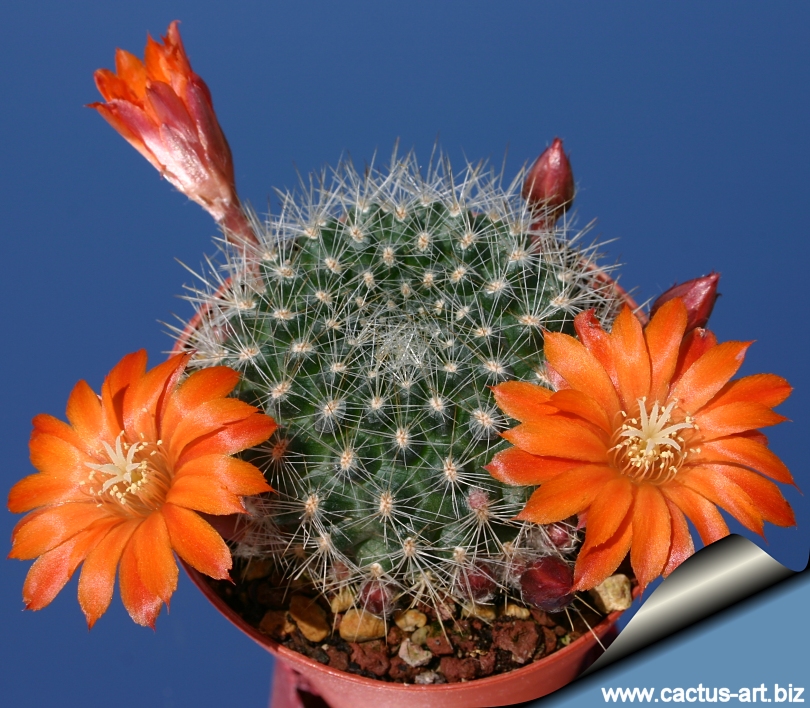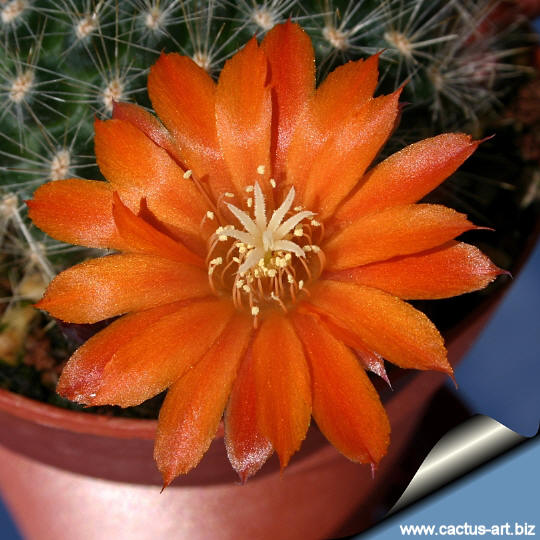|
|
|

Rebutia flavistyla FR756 Below Cajas, Tarija, Bolivia
This is is a magnificent species that
produces a sea of tiny, startling bright orange flowers.
It is one of the first Rebutias that a beginner will learn to recognize
on sight.
|
|
Description: Mound-forming plant with bristly
white spines.
Stem: 3 cm wide, 4 cm tall, dark, flat,
covered by distinctive tubercles similar to a Mammillaria, that are easy
to see through the small spines. It grows quite close to the ground and
offsets only with age. It would appear that in
cultivation they grow larger and cluster more vigorously than in
habitat.
Spines: White, fine and soft.
Flowers: Startling bright orange, funnel-shaped, 4.5 cm. long,
4 cm diameter from the base of the stems.
Blooming season: Flowers are produced profusely in spring, and
remain open for up to six days.
Fruit: Tiny, berrylike, hidden among the spines, bursting when
ripe. |
|
|
Note: Nowadays, under the name of R. fiebrigii, botanists include several different forms, that were previously regarded
as independent species, among them:
Photo of conspecific taxa,
varieties, forms and cultivars of plants
belonging to the Rebutia fiebrigii
complex (This
Taxon has lots of
synonyms (like most rebutias), with several controversial varieties and
subspecies:
|
|


Advertising
|
|
|
|
|
Family:
Cactaceae (Cactus
Family) |
Rebutia flavistyla F. Ritter
Ashingtonia 3 (1): 12, 1978
|
|
Scientific name:
Rebutia fiebrigii (Gurke)
Br.& R. ex. Bailey
in L.H.Bailey & L.H.Bailey Stand. Cycl. Hort. 1916
Origin: Mendez, Tarija, Bolivia
Conservation status: Listed in
CITES appendix 2.
Vernacular Names: Flame Crown
|
Synonyms:
- Rebutia fiebrigii flavistyla
- Aylostera flavistyla
|
|
|
|

This is one of the easiest rebutia to grow. Cuttings
of pups are easy to root, and it blooms like crazy if grown well.
Cultivation: This species
is easy to cultivate in a very open mineral mix, (lots of pumice).
It requires full sun or light shade and careful watering to keep plant
compact, and maintain strong and dense spines. Keep dry in winter.
Hardy
to -4°C. Give them
an airy spot and ensure good drainage, with soil at
least 50% sand or pumice grit.
It is better that they be repotted regularly.
Repotting will increase
the number and size of stems, and will increase the number of flowers
produced. Repot yearly until
they reach about 100 mm in size, then every
two or three years will suffice. Repotting is best done at the end of
winter, but can be done at other times,
too. Do not water for a couple of
weeks after repotting, to reduce risk of root rot via broken roots.
Keep
dry in winter. Hardy to -4°C for a short period. All, especially
the young, are susceptible to red spider mites.
Propagation: Offsets, seeds |
|